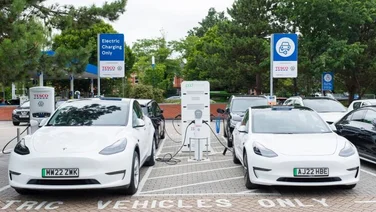Energy supplier Octopus and the National Grid have partnered to introduce process changes that will speed up the installation of green-tech, including heat pumps, solar batteries, and electric vehicle (EV) chargers.
These types of devices have a high power usage, and sometimes require the fuse for the incoming electricity supply to be upgraded before they can be installed in a home.
This is typically done by the local distribution network operator (DNO), and can delay the installation by up to 10 weeks, since the DNO needs to make sure the local grid network has the capacity to run large electrical devices such as heat pumps.
As the DNO for the Midlands, South West England, and South Wales, the National Grid has decided to allow Octopus engineers to upgrade the electricity fuse themselves (if it’s deemed necessary) when installing a heat pump, solar panel system, or EV charger in Octopus customer’s homes.
The waiting period could go down to 5 weeks for heat pump installations, according to the National Grid, as they’ve pre-approved all heat pumps provided by Octopus.
This change only applies to customers in the National Grid’s distribution area who are getting green-tech installed through Octopus, but it could pave the way for other DNOs to simplify their processes.
- A Guide To Three-phase Electricity
- Air Source Heat Pump Installation Explained
- EV Charger Installation Costs

Cordi O’Hara, President of National Grid Electricity Distribution, had this to say on the new partnership:
“Over the last five years we’ve seen the number of electric vehicle chargers installed on our network increase by eight times, and the number of heat pumps triple. These new changes to the fuse upgrade process are part of our commitment to make it even easier for customers to connect low carbon technologies.”
2023 was a record year for residential heat pump installations, according to The Microgeneration Certification Scheme (MCS), with around 35,000 installations carried out in the UK.
While impressive, this figure is still a long way off from the government’s target of having 600,000 annual heat pump installations by 2028.
The high cost of heat pumps compared to gas boilers, and the perceived complexity of the installation process remain a barrier to installation for many households. Easing these pain points plays a crucial role in increasing consumer uptake.
Plans to do this are already in motion. The government has set up the Boiler Upgrade Scheme, which takes £7,500 off the price of a heat pump, and there’s currently a consultation happening to relax permitted development rules for heat pump installations.
Heat pumps are currently subject to size restrictions, but these could soon be scrapped, as experts suggest that slightly larger heat pump units are quieter, and allowing homeowners to install them would reduce noise pollution.
As the government looks to make heat pump installations easier, it’s also rumoured to be preparing to scrap its ‘boiler tax’ scheme, which was designed to increase heat pump uptake through a system of quotas and fines for manufacturers.
This isn’t the first u-turn the government has taken when it comes to schemes for heat pumps, and there’s a danger that this mixed messaging could create more uncertainty and confusion for consumers looking to replace their boiler with a heat pump.






